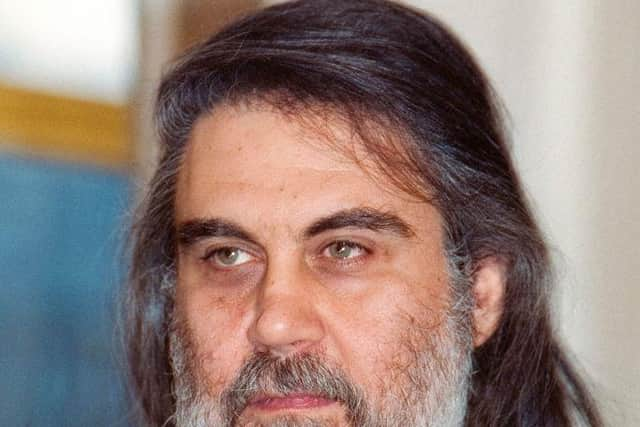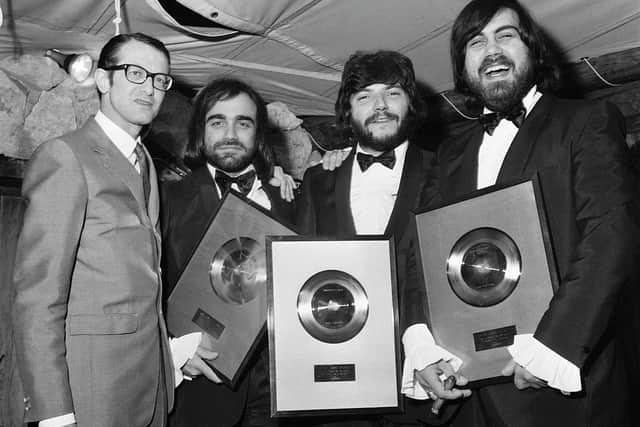Obituaries: Vangelis, Greek composer best known for Chariots of Fire score
Evángelos Odysséas Papathanassíou – or Vangelis as he is known to the film soundtrack lovers of the world – was an untutored musical seeker whose 50-year career encompassed cosmic concept albums, commissions from international space agencies and the occasional pop classic. But the Greek composer, who has died of heart failure, aged 79, remains best known for his atmospheric electronic film score for Chariots Of Fire, which spawned a thousand slo-mo sporting clips, and the arguably more influential soundtrack to Blade Runner, whose director Ridley Scott has described Vangelis as “the soul of the movie”.
His earliest international success came alongside fellow Greek music icon Demis Roussos as a member of progressive rock band Aphrodite’s Child, while he flirted with the pop charts in collaboration with Yes frontman Jon Anderson, co-writing the expansive I’ll Find My Way Home and State of Independence, which was later taken to greater creative heights by disco diva Donna Summer.
Advertisement
Hide AdAdvertisement
Hide AdThis musically prolific but personally private man pioneered melodic symphonic electronica, using synthesizers as his orchestra, but he roundly rejected the New Age label he was occasionally given as an “opportunity for untalented people to make very boring music”.


Vangelis was born in the Greek coastal town of Agria and raised in Athens. He started playing piano aged four, eschewing any formal lessons over the years in favour of spontaneity and experimentation. “Music is not something that’s written,” he said of his lack of notation skills. “Music is immediate, wild, unpredictable, multidimensional.” Through his teens he played in school bands, and soaked up jazz and rock influences alongside traditional Greek music. Aged 18, he was given a Hammond organ, which he duly painted gold, but it was the Yamaha synthesizer which would become his instrument of choice.
After a short tenure in rock band The Forminx, he scored his first film, My Brother, the Traffic Policeman, in 1963 and spent the next few years producing other artists before moving to Paris in 1968, where he formed Aphrodite’s Child with fellow Greek expats Roussos, Loukas Sideras and Anargyros “Silver” Koulouris.
The outfit enjoyed some European success but their third album 666 – a double concept album about the Book of Revelation (it was the Seventies, after all) – broke the band. Vangelis produced tracks for Roussos’s solo career but wanted to indulge his more esoteric tastes – his debut solo album Fais que ton rêve soit plus long que la nuit was a sound collage inspired by the 1968 student riots.


His next stop was London, where he auditioned to replace Rick Wakeman in prog rock behemoths Yes, but turned down the gig rather than head out on lengthy tours. Yes frontman Jon Anderson recalled their first meeting: “As I walked in he had a longbow and some arrows, which he proceeded to fire down the very big hallway. I explained he could kill someone. He just laughed, saying he was Greek.” Despite dodging an arrow, Anderson hailed his “instant good energy,” and later that decade the pair would make several albums as Jon and Vangelis.
From Nemo Studios, dubbed his London “laboratory”, Vangelis produced a series of solo concept albums on subjects as diverse as Tao philosophy and the Pompidou Centre. A trio of soundtracks to wildlife documentaries by Frédéric Rossif became his calling card to wider recognition and he found creative concord with astronomer Carl Sagan, composing the soundtrack for Sagan’s 1980 TV series Cosmos: A Personal Voyage.
Shortly afterwards, he accepted the commission to compose the music for the Eric Liddell biopic Chariots of Fire, attracted by the opportunity to create an unconventional electronic score for a period drama. The soundtrack album topped the Billboard 200 chart and sold a million copies in the US, and Vangelis went on to win the Academy Award for Best Original Score.
Chariots of Fire may have received the awards but his symbiotic score for Blade Runner is more ardently admired. The movie was a slowburn success but is now an acknowledged all-time classic, with Vangelis’s glacial music as much a part of the film’s dystopian vision of Los Angeles as the iconic visuals.
Advertisement
Hide AdAdvertisement
Hide AdVangelis teamed again with Scott ten years later on 1492: Conquest of Paradise. Across a selective filmography, he also worked with directors including Oliver Stone, Costa-Gavras and Roman Polanski. Meanwhile, the concept albums kept coming, interspersed with theatre and ballet scores and music for large scale sporting events such as the 1997 Athletics World Championships in Athens, 2000 Sydney Summer Olympics and the 2002 World Cup in Japan and Korea, for which he composed the official theme, Anthem.
Later years were full of awards and honours – from organisations as diverse as the French Legion of Honour, the American Hellenic Institute and his hometown University of Thessaly. He was honoured with his image on a Greek postage stamp but one fancies he would have been most taken with having a minor planet, 6354 Vangelis, named after him.
His music has also gone interstellar. In keeping with his lifelong love of cosmology, he composed music for Stephen Hawking’s 2018 memorial, which was beamed by the European Space Agency from earth to the nearest black hole. His 2021 album From Juno to Jupiter, inspired by the Juno space probe, was the last in a series of collaborations with Nasa and was to be Vangelis’s swansong. “For me music is science more than art,” he said. “It is the main code of the universe.”
OBITUARIES
If you would like to submit an obituary (800-1000 words preferred, with jpeg image), or have a suggestion for a subject, contact [email protected]
SUBSCRIBE
Subscribe at www.scotsman.com/subscriptions
